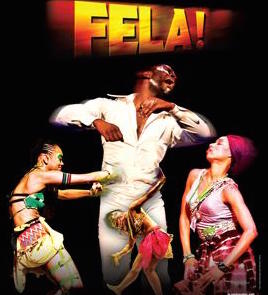Fela Kuti: Pioneering Afrobeat and Political Movements Simultaneously
by Mark Petzing, undergraduate student in Honors Biology and Pre-Medical studies
Fela Kuti was born and lived in Nigeria for most of his life, where he initiated many bands and political movements that were characteristic of his brand and music.(2)
Fela Kuti and his family in Nigeria
Fela Kuti pioneered a new form of music: Afrobeat, a blend of traditional African sounds blended with those of music from western cultures. One example of this fusion is in his song “My Lady Frustration.” He utilizes chants and vocables that draw from African cultures as well as a blend of Western gospel and church sounds.(4)
Fela Kuti’s album “The ’69 Los Angeles Sessions” containing his track “My Lady Frustration”
As a means to help spread his message as well as his music, Fela created “The New Africa Shrine,” his own nightclub dedicated to allowing people to come together under common ideals and music all in one place. Fela hoped for a new society to be created in Africa and his use of his own night club was a concrete display of this intention.(3)
Fela Kuti’s club, “The New Africa Shrine”
After colonialism from the British subsided and Nigeria was set to establish its government, power and military force, seemed to cloud the common good of the people. In Fela’s song “Sorrow Tears and Blood,” he uses his lyrics as a platform to allow people to recognize how abysmal post-colonial Nigeria is. In a sequential stanza of the same song, Fela describes how the police and army seem to come into civilians’ lives, end up hurting or killing many of them, and never seem to go away.(1) His music was both a means of sympathy to allow civilians to hear that their feelings were real, as well as a plea to the Nigerian people and government to help create a change for the better.
Fela Kuti’s song “Sorrow Tears and Blood”
Fela’s influence was so prominent that it even prompted a musical to be created about him that premiered in November of 2010 and ran for four months. This musical was produced by individuals who were greatly affected by his work and message such as Jay-Z and Will & Jada Pinkett Smith.(5)
Musical based on Fela Kuti’s life named “FELA!”
Although Fela died in 1997, his story and legacy live on in both the music he created as well as the movements he pioneered for the good of all people. His work touched the hearts of millions and continues to be a display of bringing cultures together under the beautiful umbrella of music.
*Click on any pictures or highlighted text for more information*
References
(1) (2012) Fela Kuti and the oppositional lyrical power, Muziki, 9:1, 1-12, DOI: 10.1080/18125980.2012.737101
(2) “Story.” Fela Kuti, felakuti.com/us/story/. Accessed 9 Dec. 2023.
(3) Grass, Randall F. “Fela Anikulapo-Kuti: The Art of an Afrobeat Rebel.” The Drama Review: TDR 30, no. 1 (1986): 131–48. https://doi.org/10.2307/1145717.
(4) Stewart, Alexander. “Make It Funky: Fela Kuti, James Brown and the Invention of Afrobeat.” American Studies 52, no. 4 (2013): 99–118. http://www.jstor.org/stable/24589271.
(5) Lyons, Luisa. “Fela!” FILMED LIVE MUSICALS, Feb. 2017, www.filmedlivemusicals.com/fela.html.




